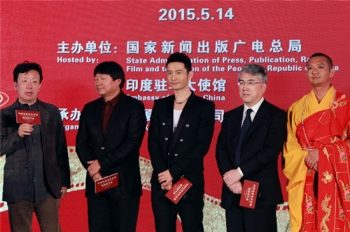The state-owned Chinese Film Corporation (CFC) and Indian film company Eros International are to co-produce a film about the Chinese monastic pilgrim Xuanzang (c. 602–64), the Chinese title of which may be translated as Xuanzang of the Great Tang (大唐玄奘).
The announcement was made in Beijing on 14 May, timed to coincide with a state visit to China by Indian prime minister Narendra Modi. Throughout the trip, government sources and the wider press touted Buddhism as an enduring and historical cultural bridge benefiting Sino-Indian exchange and cooperation. Modi was given a tour of the Daxingshan Temple and the Giant Wild Goose Pagoda in Xi’an, both of which contain important Buddhist relics.
CFC head La Peikang, Eros International president (business development) Kuma Ahuja, and vice minister of the State Administration of Press, Publication, Radio, Film, and Television of the People’s Republic of China Tong Gang were present at the announcement. Also in attendance were the film’s director, Huo Jianqi, and acting star Huang Xiaoming, who will play Xuanzang. According to the Chinese news agency Xinhua, Huang has begun a vegetarian diet to get a better sense of his new role.
The Hollywood Reporter inaccurately reports that Xuanzang is “credited with bringing Buddhist teachings from India to China,” when Buddhism was present in China as early as the Han dynasty (206 BCE–220 CE). However, Xuanzang did bring back copious quantities of important scriptures from India to the Tang dynasty (618–907) court. This was part of a wider effort by imperial and monastic translators to correct Chinese misconceptions about Buddhism (due to its earlier fusion with Daoism and native Chinese folk religion during the Han). Xuanzang was famously dissatisfied with the dearth of quality Chinese translations of Indian Buddhist texts, which led him to set off to the west.
Upon his return to China and until his death in Chang’an (modern-day Xi’an), Xuanzang undertook several meticulous translation projects that remain widely used today, such as that of the Mahaprajnaparamita Sutra. An eloquent and erudite thinker of the Yogacara tradition, he was also responsible for the short-lived but influential Faxiang school of Buddhism.
A fictionalized version of Xuanzang, “Tripitaka,” is the protagonist in the Ming-era fantasy novel Journey to the West, one of China’s most famous and important novels. In the story he also makes a journey to India, but is protected by the famous supernatural trio of Sun Wukong, Zhu Bajie, and Sha Wujing (who have themselves become pop culture icons).
The Journey to the West personality of Tripitaka has been popularized and reinterpreted across East Asian media in the form of films, comics, video games, cartoons, and more, although Xuanzang of the Great Tang will portray the historical pilgrim rather than Tripitaka of Journey to the West. Who will play Xuanzang’s companions in the film is currently unknown, although veteran Bollywood actor Amitabh Bachchan will star alongside Huang.
The agreement for the joint production of Xuanzang of the Great Tang was signed on 16 May, and shooting for the film is expected to begin on 25 May. More co-productions are expected to be filmed in the future.
See more
India-China Coproduction ‘Monk Xuan Zang’ Announced (Hollywood Reporter)
黄晓明《大唐玄奘》饰唐玄奘为新戏开始食素(Chinese only) (Xinhua)















